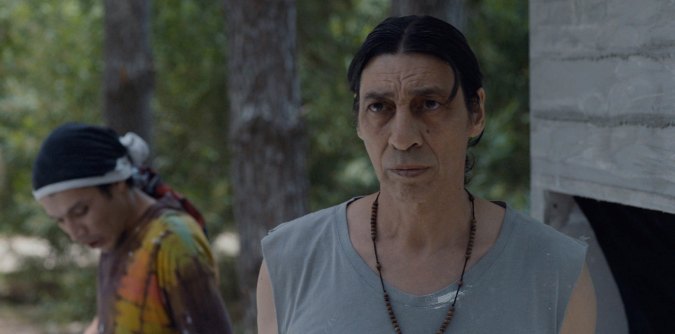There’s a discomfort that’s baked right into the premise of Verónica Chen’s Marea alta (High Tide). Wading into prickly territory that dramatizes gender and class divisions, this quiet character study of a woman on the verge of a nervous breakdown plays out like a slowed-down home invasion thriller where you never know who to root for, those invading or those losing control of their property.
Laura (Gloria Carrá) has retreated to her summer seaside home in the offseason to oversee the new grilling station she and her husband have decided to build in time for the summer months. An artist by nature and by trade, Laura spends her days working on drafts of her latest project while only nominally paying attention to the laborers at her home. That is, until one night she playfully engages the lead contractor, Weisman (Jorge Sesán) whose rugged demeanor titillates and thrills her. But even in their flirtatious banter, Chen’s masterful way of creating discordant tonal shifts suggest there’s already something amiss. “You like to fuck a lot?” Weisman asks Laura as they begin kissing. Despite his casual tone she’s taken aback and in Carrá’s eyes you see Laura trying to decide how to proceed: Should she be offended or flattered? Turned on or demeaned?
Even as she brushes aside his further lascivious comments (“Do you like dick?”), she lets herself be seduced by him. Or maybe she seduces him. The power dynamics are muddled from the start. Thus, when he leaves her bed the next day and Laura realizes the two laborers he had been supervising have figured out what went on during the night, she finds herself slowly losing her footing and her authority. Weisman doesn’t come back at all, forcing Laura to leave him pleading voice mails about what becomes an untenable situation with her workers.

At first, Toto and Hueso (Cristian Salguero and Hector Bordoni) are merely despondent. They talk back at her, take long breaks and make off-color jokes about her sex life in ways that are meant to make her unsafe. Soon, they’re staying in tents in her backyard, refusing to work altogether and bring other women into her living room while she’s away. Weisman is nowhere to be seen.
Chen is fascinated by Laura’s ill-advised choices: She refuses to answer her husband’s calls, decides against calling the police and convinces herself that merely staying indoors is a perfectly normal way of dealing with this escalating problem. Laura’s frailty, which Chen captures in anguished close-ups where Carrá manages to show us the instability of her character, is clearly a symptom of something else. She sees handling this little crisis of her own making as a way to gain back some control in her life. And to judge by High Tide’s ending — which involves a buried body and some quite brazen social commentary — Chen is eager to use Laura and her relationship with Totio and Hueso as emblematic of greater social ills.
The discomfort that runs through the film, especially during its dialogue-free scenes where Chen builds tension out of the emptiness that surrounds Laura’s remote house, slowly fills you with dread. Toto and Hueso could at any moment attack Laura. Or so she thinks. They become shadowy figures lurking within the film’s chiaroscuro cinematography, which makes Laura’s house, with its wall-to-wall windows, feel both like a safe haven and a prison. But Laura is no damsel in distress; she still clings to the power she knows she has: her wealth and her stature. This is what seemingly make Toto and Hueso all the more dangerous: Their lascivious behavior toward her gets latched onto their class and their race; they are literal darkened figures who terrorize the frail light-skinned woman in the forest.
Much as recent films like Parasite and Mano de obra, High Tide makes us keenly aware of these variously intersecting identities, using a beautifully constructed house as the setting for a miniature treatise on class warfare. The gender and class dynamics at play here collide in increasingly uncomfortable ways: Toto and Hueso lose any respect they had for Laura to begin with and outright disrespect her, turning their slut-shaming into a weapon that Laura cannot deflect. In turn, Laura uses her wealth as a shield to excuse the way she dehumanizes them, seeing and treating them like animals. Whether Chen’s ending is designed to settle which side we’re supposed to take or otherwise highlight the glaring disparity in who gets to “win” in these situations, the unease with which one leaves the theater is palpable.
High Tide screened as part of the 2020 Sundance Film Festival.




